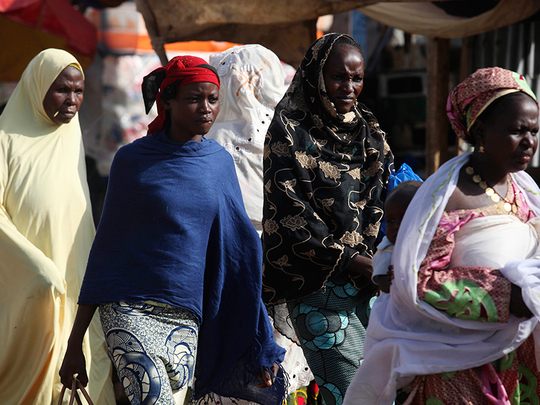
Niamey: Niger has stepped up the fight against breast and cervical cancer, using screening and public awareness campaigns to reverse a scourge affecting more and more women in the prime of life.
“The situation in Niger is very alarming,” said oncologist Issimouha Dille. “Breast and cervical cancer are serious public health problems.”
The World Health Organisation (WHO) says some 8,000 new cancer cases are recorded each year in the poor Sahel country, which has a life expectancy of 56 years.
More than a quarter of the cases — 27 per cent — are breast cancer, followed by cervical cancer, which accounts for 14 per cent of cases, according to hospital statistics.
Dille, who heads the humanitarian group SOS-Cancer, said ignorance and poverty impeded efforts to address the problem.
“Especially deep in the countryside, women suffer in silence,” viewing cancer as an “evil spell”, Dille said.
A humanitarian official added: “In the absence of medical care, sufferers consult witch doctors and often die in their huts.”
Dille said screening for the two forms of cancer has previously been aimed at women between 50 and 60 years of age, but that today clinics are seeing patients aged 35 and even younger.
“A woman who is still active can succumb to ill health because we don’t have the means to treat her,” she said. “This woman will die.”
When “a portion of the active population, which helps the country develop, when this portion dies, what will we do? There will be no development,” Dille said.
With the help of international partners such as the WHO, the former French colony has decided to give priority to prevention efforts.
“We can prevent cervical cancer by screening,” Dille said, noting that the test costs less than six euros (Dh24) per patient.
Treatment costs are astronomical in comparison “when we account for the surgery, radiation, chemotherapy — with little chance of recovery, I might add,” she said.
Last month SOS-Cancer carried out a public awareness campaign in several towns, offering free screening to more than 500 women, a number of whom it said tested positive.
In 2014, the government launched a free programme to vaccinate girls between nine and 13 against cervical cancer, reaching more than 19,000 girls, most in the capital Niamey.
The pilot project will soon be extended to the whole country, with Health Minister Mano Aghali stressing on national television that the vaccine offers lifelong protection.
A radiation therapy centre is under construction in Niamey with support from the International Atomic Energy Agency.
Currently, most cancer patients have access only to palliative care, with only a “handful” of Nigeriens able to afford the prohibitive cost of seeking treatment abroad, a hospital source said.
The message that screening is a “necessity” is one that SOS-Cancer is trying to spread nationwide through television and radio broadcasts in local languages.
Posters with pictures of cancer patients who have had a breast or a limb removed hang in a variety of public places, as well as outside pharmacies.
“If the ravages of cancer are added to a high birth rate and endemic food crises, the impacts may be unsustainable for Niger,” one of the world’s poorest countries, Dille said.
Girls often marry at an extremely young age and Niger’s culture encourages large families, with the current average standing at 7.6 children per family.
Two in three girls are married by age 15, and a girl or woman dies every two hours from complications linked to pregnancy or childbirth, according to the UN Population Fund in Niamey.
“The only advice I can give to my sisters is that if they ever have cancer, they should not go to the witch doctor,” said a cancer patient who gave her name only as Aicha.
“They should come quickly to a health centre before the disease develops. Cancer is a hidden illness that we don’t see, it develops on the inside and defeats its victim.”












